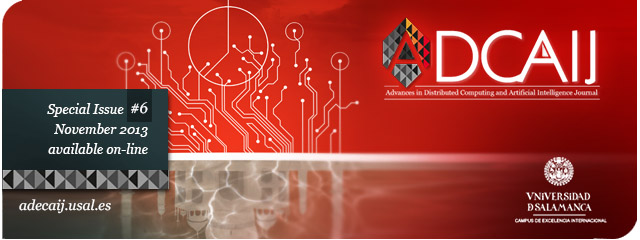ADCAIJ (ISSN: 2255-2863), the electronic journal prepared by the BISITE research group on artificial intelligence and distributed computing, edited by the University of Salamanca, has just published its sixth issue. This is the first Spanish publication in this field. During its first 18 months, it has managed to secure a place among internationally renowned journals.
The publication, which is an acronym for strong>Advances in Distributed Computing and Artificial Intelligence Journal , gathers research articles from experts all over the world. Its members of the editorial review board include representatives from the University of Utrecht, São Paulo, SUNY (US), (NTNU (Norway), and from the CNRS Laboratory in Grenoble (France), among other institutions.
Its launch and development coincide with a growing interest in the application of artificial intelligence in distributed environments such as the Internet, e-commerce, telecommunications and wireless systems, among others. For this reason, and to facilitate access to both the international research community and companies interested in the development of innovative projects in these fields, access to ADCAIJ is open and free.
The publication can be access through the digital repository of the University of Salamanca. A new issue will be released every quarter and will be fully edited in English. The publication has an ISSN number and has already been indexed in all major data bases in the world.
Keyworks: Distributed applications ICTs: trade, medicine, industry, the Internet, Implementation of AI Bioinformatics, Implementation of AI Biotechnology, Implementation of AI in the development of mobile devices, Networks, Intelligent environments, Distributed Algorithms, Computer GRID, Distributed databases, Multimedia and distributed animation systems, Distributed Operating Systems, Real Time Systems, Trade and Electronic Business, Systems and fault-tolerant real-time systems, Distributed Architectures, Multiagent Systems, High-performance, Languages, Compilers, planning, load balancing, E-learning, Technology for Internet, Middleware, Mobile and wireless systems, Security, Parallel, Software Engineering and Formal Methods, Distributed Intelligent Information Systems, Robotics and Control, Satisfaction of restrictions, Search heuristics, Model based reasoning, Reasoning not monotonic, Planning and scheduling tasks, Qualitative Reasoning, Reasoning with uncertainty, Temporal and spatial reasoning, Other reasoning models, Case based reasoning, Data Analysis, Evolutionary Computation, Neural networks, Learning through reinforcement, Other models of learning, Applications of AI (TTIA), Logic, System support for decision-making, Intelligent Interaction, Knowledge Management, Knowledge Representation
